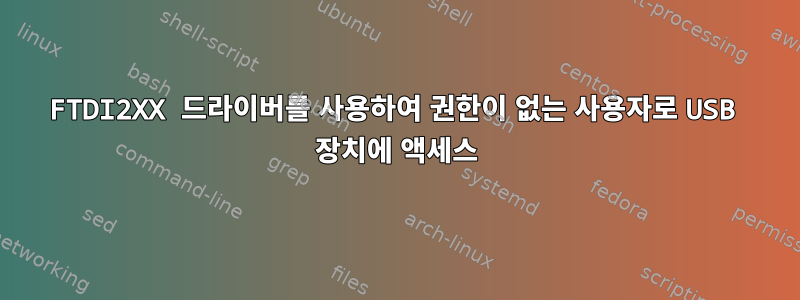
libFtd2xx(버전: libftd2xx.so.1.3.6) 드라이버를 사용하여 USB 장치에 액세스하려고 합니다.
드라이버 링크:http://www.ftdichip.com/Drivers/D2XX/Linux/ReadMe-linux.txt... 사용된 장치의 기능을 테스트합니다.단순한예제 디렉터리의 내용과 아래에 언급된 내용은 실행 중 출력됩니다.
루트 아래
venkat:/opt# ./simple-dynamic
Device 0 Serial Number - 12Z9UXGV
Device 1 Serial Number -
Opened device 12Z9UXGV
NON_권한이 있는 사용자
venkat@venkat:/opt$ ./simple-dynamic
Error: FT_ListDevices(2)
ROOT 사용자에서: 장치 액세스가 예상대로 작동합니다. 그러나 일반 사용자로 실행하려고 하면 해당 장치에 접근할 수 없습니다.
나는 이것이 일부 권한과 관련이 있다고 생각합니다. 그러나 이것을 통과할 수는 없습니다.
스트레스 차이
뿌리
open("/dev/bus/usb/001/005", O_RDWR) = 10
일반 사용자
open("/dev/bus/usb/001/005", O_RDWR) = -1 EACCES (Permission denied)
이 애플리케이션을 실행하기 전에 확인한 사항은 다음과 같습니다.
1. rmmod ftdi_sio (as super user)
2. chmod 0755 /usr/local/lib/libftd2xx.so.1.3.6
3. ln -sf /usr/local/lib/libftd2xx.so.1.3.6 /usr/local/lib/libftd2xx.so
또한 UDEV에 권한을 추가해 보세요.
ACTION=="add", SUBSYSTEMS=="usb", ATTRS{idVendor}=="0403", ATTRS{idProduct}=="6014", MODE="0755"
이 문제를 해결하기 위해 지침을 요청합니다.
소스 예:
/* 최대 4개의 장치를 여는 간단한 예 - 일부 데이터를 쓰고 다시 읽습니다. 또한 목록 장치를 사용하는 방법도 표시됩니다. 장치에 루프백 커넥터가 있고 일련 번호도 있다고 가정 */
/*To build use the following gcc statement
(assuming you have the d2xx library in the /usr/local/lib directory).
gcc -o simple main.c -L. -lftd2xx -Wl,-rpath /usr/local/lib
*/
#include <stdio.h>
#include <stdlib.h>
#include <string.h>
#include <unistd.h>
#include "../ftd2xx.h"
#define BUF_SIZE 0x10
#define MAX_DEVICES 5
static void dumpBuffer(unsigned char *buffer, int elements)
{
int j;
printf(" [");
for (j = 0; j < elements; j++)
{
if (j > 0)
printf(", ");
printf("0x%02X", (unsigned int)buffer[j]);
}
printf("]\n");
}
int main()
{
unsigned char cBufWrite[BUF_SIZE];
unsigned char * pcBufRead = NULL;
char * pcBufLD[MAX_DEVICES + 1];
char cBufLD[MAX_DEVICES][64];
DWORD dwRxSize = 0;
DWORD dwBytesWritten, dwBytesRead;
FT_STATUS ftStatus;
FT_HANDLE ftHandle[MAX_DEVICES];
int iNumDevs = 0;
int i, j;
int iDevicesOpen;
for(i = 0; i < MAX_DEVICES; i++) {
pcBufLD[i] = cBufLD[i];
}
pcBufLD[MAX_DEVICES] = NULL;
ftStatus = FT_ListDevices(pcBufLD, &iNumDevs, FT_LIST_ALL | FT_OPEN_BY_SERIAL_NUMBER);
if(ftStatus != FT_OK) {
printf("Error: FT_ListDevices(%d)\n", (int)ftStatus);
return 1;
}
for(i = 0; ( (i <MAX_DEVICES) && (i < iNumDevs) ); i++) {
printf("Device %d Serial Number - %s\n", i, cBufLD[i]);
}
for(j = 0; j < BUF_SIZE; j++) {
cBufWrite[j] = j;
}
for(i = 0; ( (i <MAX_DEVICES) && (i < iNumDevs) ) ; i++) {
/* Setup */
if((ftStatus = FT_OpenEx(cBufLD[i], FT_OPEN_BY_SERIAL_NUMBER, &ftHandle[i])) != FT_OK){
/*
This can fail if the ftdi_sio driver is loaded
use lsmod to check this and rmmod ftdi_sio to remove
also rmmod usbserial
*/
printf("Error FT_OpenEx(%d), device %d\n", (int)ftStatus, i);
printf("Use lsmod to check if ftdi_sio (and usbserial) are present.\n");
printf("If so, unload them using rmmod, as they conflict with ftd2xx.\n");
return 1;
}
printf("Opened device %s\n", cBufLD[i]);
iDevicesOpen++;
if((ftStatus = FT_SetBaudRate(ftHandle[i], 9600)) != FT_OK) {
printf("Error FT_SetBaudRate(%d), cBufLD[i] = %s\n", (int)ftStatus, cBufLD[i]);
break;
}
printf("Calling FT_Write with this write-buffer:\n");
dumpBuffer(cBufWrite, BUF_SIZE);
/* Write */
ftStatus = FT_Write(ftHandle[i], cBufWrite, BUF_SIZE, &dwBytesWritten);
if (ftStatus != FT_OK) {
printf("Error FT_Write(%d)\n", (int)ftStatus);
break;
}
if (dwBytesWritten != (DWORD)BUF_SIZE) {
printf("FT_Write only wrote %d (of %d) bytes\n",
(int)dwBytesWritten,
BUF_SIZE);
break;
}
sleep(1);
/* Read */
dwRxSize = 0;
while ((dwRxSize < BUF_SIZE) && (ftStatus == FT_OK)) {
ftStatus = FT_GetQueueStatus(ftHandle[i], &dwRxSize);
}
if(ftStatus == FT_OK) {
pcBufRead = realloc(pcBufRead, dwRxSize);
memset(pcBufRead, 0xFF, dwRxSize);
printf("Calling FT_Read with this read-buffer:\n");
dumpBuffer(pcBufRead, dwRxSize);
ftStatus = FT_Read(ftHandle[i], pcBufRead, dwRxSize, &dwBytesRead);
if (ftStatus != FT_OK) {
printf("Error FT_Read(%d)\n", (int)ftStatus);
break;
}
if (dwBytesRead != dwRxSize) {
printf("FT_Read only read %d (of %d) bytes\n",
(int)dwBytesRead,
(int)dwRxSize);
break;
}
printf("FT_Read read %d bytes. Read-buffer is now:\n",
(int)dwBytesRead);
dumpBuffer(pcBufRead, (int)dwBytesRead);
if (0 != memcmp(cBufWrite, pcBufRead, BUF_SIZE)) {
printf("Error: read-buffer does not match write-buffer.\n");
break;
}
printf("%s test passed.\n", cBufLD[i]);
}
else {
printf("Error FT_GetQueueStatus(%d)\n", (int)ftStatus);
}
}
iDevicesOpen = i;
/* Cleanup */
for(i = 0; i < iDevicesOpen; i++) {
FT_Close(ftHandle[i]);
printf("Closed device %s\n", cBufLD[i]);
}
if(pcBufRead)
free(pcBufRead);
return 0;
}


